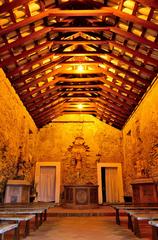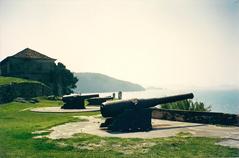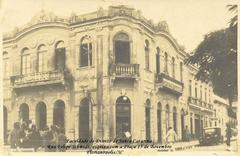
Fort of San Francisco Javier: Visiting Hours, Tickets, and Historical Significance in Florianópolis, Brazil
Date: 04/07/2025
Introduction
The Fort of San Francisco Javier (Forte de São Francisco Xavier da Ilha de Santa Catarina) is one of Florianópolis’s most significant historical landmarks. Perched on Santa Catarina Island, this 18th-century fortress is a testament to Brazil’s colonial past, combining military architecture with breathtaking views of the coast. Whether you’re a history aficionado, a cultural explorer, or simply a traveler in search of unique destinations, this guide provides all the essential information for planning your visit—covering historical context, visiting hours, ticketing, accessibility, guided tours, nearby attractions, and travel tips.
For up-to-date information, official resources such as the UFSC website, Florianópolis tourism portal, and trusted travel platforms are highly recommended (Guia Floripa, iHeartBrazil, facts.net).
Table of Contents
- Historical Background and Strategic Importance
- Architecture and Preservation
- Visiting the Fort: Hours and Tickets
- Facilities, Accessibility, and Visitor Tips
- Guided Tours and Interpretation
- Events and Community Engagement
- Nearby Historical Sites and Attractions
- Practical Information and Contacts
- Frequently Asked Questions (FAQ)
- Conclusion & Recommendations
- References
Historical Background and Strategic Importance
Constructed in the early 18th century during the intense Portuguese-Spanish rivalry, the Fort of San Francisco Javier was a pivotal part of the defense system safeguarding the maritime routes near Florianópolis (then Nossa Senhora do Desterro). Its star-shaped design and strategic location at the entrance to Baía Norte allowed Portuguese forces to monitor and control naval access, protecting the city and surrounding settlements from foreign incursions (Guia Floripa, facts.net).
Together with nearby fortresses such as Fortaleza de Santa Cruz de Anhatomirim and Fortaleza de Santo Antônio de Ratones, it formed a defensive triangle that ensured the safety of vital trade and communication routes between southern Brazil and the rest of the Portuguese Empire (facts.net).
Architecture and Preservation
Architectural Features
The fort is a classic example of 18th-century European military engineering, characterized by:
- Star-shaped bastions to maximize defensive coverage.
- Thick granite curtain walls and angular bastions for overlapping fields of fire.
- Machicolations, embrasures, and drawbridge for optimized defense.
- Internal structures including the Commander’s House, barracks, storerooms, and a chapel.
Original construction techniques used locally quarried granite and lime mortar, with traditional Portuguese clay roof tiles. The site’s robust design allowed it to withstand both natural elements and potential attacks (iHeartBrazil, Aventura do Brasil).
Preservation Efforts
Managed by the Instituto do Patrimônio Histórico e Artístico Nacional (IPHAN), the fort is legally protected and benefits from ongoing restoration work. Efforts focus on wall stabilization, roof repair, archaeological excavation, and the implementation of interpretive signage. Community engagement is fostered through school programs and cultural events, ensuring the fort’s continued relevance (iHeartBrazil).
Visiting the Fort: Hours and Tickets
- Open: Tuesday to Sunday, 9:00 AM – 5:00 PM
- Closed: Mondays and selected public holidays
- Admission: R$15 for adults; discounts for students and seniors; free for children under 6. In some periods or during special events, entry may be free or reduced (Florianópolis tourism portal).
- Ticket Purchase: At the entrance or in advance online via the official tourism website.
Facilities, Accessibility, and Visitor Tips
Facilities
- Restrooms: Clean facilities near the entrance.
- Visitor Center: Offers maps, brochures, and multilingual information.
- Café/Kiosk: Snack and beverage options during peak seasons.
- Gift Shop: Sells books, local crafts, and souvenirs supporting preservation.
Accessibility
Recent renovations have added ramps and handrails to facilitate access for visitors with limited mobility, although some areas (such as upper ramparts) remain challenging due to the historic structure. The main museum is wheelchair accessible; accessible restrooms are available.
Visitor Tips
- Wear comfortable shoes for cobblestone paths and uneven surfaces.
- Bring sun protection and water, especially in summer.
- Early morning or late afternoon visits offer cooler temperatures and fewer crowds.
- Most signage is in Portuguese; translation apps can be helpful.
Guided Tours and Interpretation
Guided tours are available on weekends and holidays in Portuguese, with occasional English or Spanish tours depending on staff. These tours provide valuable context on the fort’s history and architecture. For groups or special needs, advance booking is recommended (iHeartBrazil).
Self-guided exploration is supported by interpretive panels throughout the site.
Events and Community Engagement
The fort is a vibrant venue for cultural activities:
- Historical reenactments and festivals showcase colonial military life.
- Art exhibitions and music performances are held in the central courtyard and Commander’s House.
- Educational workshops engage local schools and university groups (cdamag.io).
Check the official tourism portal for event schedules.
Nearby Historical Sites and Attractions
Enhance your visit by exploring:
- Fortaleza de Santa Cruz de Anhatomirim and Fortaleza de Santo Antônio de Ratones: Accessible by boat tours, these forts offer further insight into the region’s defense network.
- Metropolitan Cathedral and São Francisco de Assis Church: Notable for their colonial architecture in Florianópolis’s historic center.
- Beaches of Jurerê and Canasvieiras: Ideal for relaxing after your historical tour.
- Praia de Fora and Avenida Beira-Mar Norte: Provide additional scenic and leisure opportunities (iHeartBrazil, facts.net).
Practical Information and Contacts
- Location: Northern tip of Santa Catarina Island, Florianópolis.
- Transport: Reachable by car, taxi, or local bus. Parking is available but limited during high season.
- Emergency Services: Dial 190 (police), 192 (medical), or 193 (fire).
- Tourist Information: Florianópolis tourism portal.
Frequently Asked Questions (FAQ)
Q: What are the visiting hours of the Fort of San Francisco Javier?
A: Tuesday to Sunday, 9:00 AM – 5:00 PM; closed Mondays and public holidays.
Q: How much are tickets?
A: R$15 for adults; discounts for students and seniors; free for children under 6.
Q: Are guided tours available?
A: Yes, especially on weekends and holidays. Advance booking recommended for groups.
Q: Is the site accessible for visitors with disabilities?
A: Some ramps and handrails are present, but certain areas may be challenging.
Q: What are some nearby attractions?
A: Other forts, colonial churches, historic city center, and the beaches of Jurerê and Canasvieiras.
Q: Are pets allowed?
A: Only service animals are permitted inside the fort.
Conclusion & Recommendations
The Fort of San Francisco Javier is a living monument that encapsulates the rich colonial history, architectural ingenuity, and cultural identity of Florianópolis. Its well-preserved bastions, panoramic coastal vistas, and ongoing community engagement make it an essential stop for any visitor to southern Brazil. For the best experience, consult official tourism resources for the latest updates, consider joining a guided tour, and combine your visit with other historical and natural attractions in the region.
For real-time information, event schedules, and exclusive travel tips, download the Audiala app and follow us on social media. Embark on your journey into Brazil’s past with a visit to the Fort of San Francisco Javier—a true treasure of Florianópolis.
References
- This comprehensive guide is based on information from Guia Floripa, iHeartBrazil, facts.net, and the Florianópolis tourism portal.
- Additional historical context and architectural details: Aventura do Brasil, cdamag.io, tempoutil.com.







